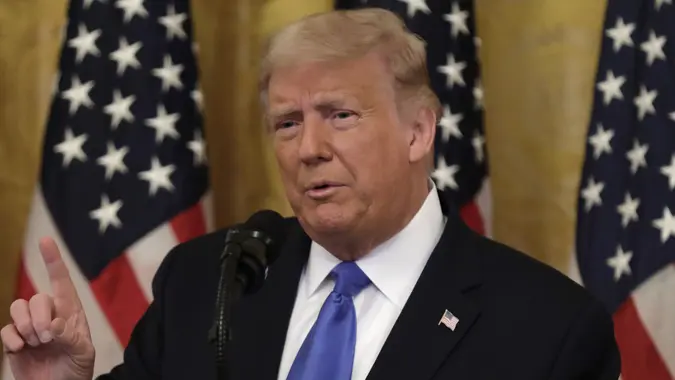How Could a Trump Second Term Impact Rich People?

Commitment to Our Readers
GOBankingRates' editorial team is committed to bringing you unbiased reviews and information. We use data-driven methodologies to evaluate financial products and services - our reviews and ratings are not influenced by advertisers. You can read more about our editorial guidelines and our products and services review methodology.

20 Years
Helping You Live Richer

Reviewed
by Experts

Trusted by
Millions of Readers
The presidential election is fast approaching, and it’s shaping up to be a fierce battle between Donald Trump and President Joe Biden. While it’s anyone’s race at this point, recent polling data from the Pew Research Center shows a staggering 49% of voters, if given the chance, would opt to replace both Trump and Biden with fresh faces in this election.
While we will not know the outcome until Nov. 5, finance experts provide a reassuring perspective. They assert that the election results will not significantly impact the stock market, regardless of the winner.
Nicholas A. Juhle, CFA and chief investment officer with Greenleaf Trust, said, “We encourage our clients to be wary of headlines suggesting one candidate or the other will help or harm the stock market. Historically, U.S. stocks have performed well under both Republican and Democratic presidential administrations, including both Presidents Trump and Biden. History suggests you should vote with your ballot, not with your portfolio.”
That said, Trump does have policies that impact the wealthy, and GOBankingRates spoke with finance experts who explained how.
Also see how he could impact your wallet.
The Tax Cuts and Job Acts
The Tax Cut and Jobs Act (TCJA) is a policy that benefits the wealthy.
“During Donald Trump’s first term as president, he signed into law the 2017 TCJA, which reduced individual income taxes for most brackets and reduced the corporate income tax rate to a flat 21% — from a tiered schedule ranging from 15% to 39%,” Juhle explained.
“Several of the TCJA provisions sunset after 2025, including the individual income tax, gift and estate tax exemptions, and expanded standard deductions. The 21% corporate income tax rate is permanent and would require new legislation to change.”
Mike Dion, senior manager of finance for a Fortune 100 entertainment company and founder of F9Finance, also gave insight into the TCJA.
“President Trump has committed to extending the Tax Cuts and Jobs Act of 2017 if he is elected to a second term,” he said. “The tax cuts would otherwise begin expiring in 2025. The law increased the estate tax threshold, lowered the top margin tax bracket, and reduced corporate and pass-through taxes to a flat 21% and 20% rate respectively.
“The extension of these tax cuts would significantly benefit the wealthy, both through their personal tax rate being lowered, as well as through their investments as corporate and pass-through profits would continue to be taxed at a lower level.”
How Much the Tax Cuts and Job Acts Impact the Rich
According to the Center on Budget and Policy Priorities, a nonpartisan research and policy institute, the tax policy is favorably skewed toward the wealthy.
“Households with incomes in the top 1% will receive an average tax cut of more than $60,000 in 2025, compared to an average tax cut of less than $500 for households in the bottom 60%,” CBPP’s site stated.
The research from CBPP compared President George W. Bush’s policy that helped the wealthy to Trump’s.
“Like the Bush tax cuts that came before it, the 2017 tax law benefited high-income households far more than households with low and moderate incomes,” per the site. “Extending the Trump tax cuts that expire at the end of 2025 — namely, the law’s individual income and estate tax provisions — would provide further windfall benefits to high-income households. These cuts would come on top of the large benefits they would continue to receive from the 2017 tax law’s permanent provisions.”
 Written by
Written by  Edited by
Edited by 

























